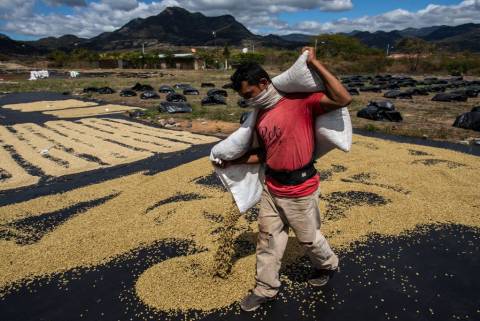(Bloomberg) -- Nestle SA, the world’s largest coffee company, will invest more than 1 billion Swiss francs ($1 billion) by 2030 to encourage farmers supplying its Nescafe brand to employ more sustainable farming methods as climate change and extreme weather threaten crops.

Nestle will offer training about the best planting techniques as well as cash incentives to motivate farmers to take actions, such as planting cover crops to protect the soil. With a sprawling network of more than 500,000 farmers sourcing beans for Nescafe, the company intends to double the number of suppliers it works with on such issues to at least 200,000.

The supply of coffee is menaced by climate change: the crop is grown near the equatorial belt, which has been most susceptible to extreme weather, including droughts and hurricanes. Rising temperatures are a long-term threat and will reduce the area suitable for growing coffee by as much as 50% by 2050, according to the Inter-American Development Bank. Severe frosts in Brazil slashed last year’s crop and also curbed the potential for 2022.
“We will not have viable coffee farms in 20 or 30 years if we don’t take action now,” said David Rennie, head of Nestle’s coffee business.
That’s why Nescafe is boosting its efforts to support farmers transitioning to more regenerative practices. Through training, technical help and high-yielding coffee plantlets, Nescafe can help farmers improve soil health, plant fertility and water usage, Rennie said.
Nescafe aims to source all of its coffee responsibly by 2025, up from 82% in 2021. It also wants a fifth of it to be farmed with regenerative methods by 2025 and half by 2030.
Examples of what the program will do include replacing coffee trees with disease- and climate-change-resistant varieties, which can help rejuvenate coffee plots and increase yields for farmers. Nestle is offering incentives and premiums for responsibly sourced beans because not enough farmers are implementing such measures on their own.
Influential Buyer
With more than 5,500 cups of Nescafe being drunk across the world every second and more than 10 billion francs in sales, Nescafe is an influential coffee buyer, snapping up 8% to 9% of the world’s green beans. But making coffee farming more sustainable is a complex problem. Investing in regenerative practices can be risky and costly for impoverished farmers on their own, especially due to market volatility and speculation.
More than 80% of coffee farming families live at or below the poverty line, according to TechnoServe, a non-profit organization. They’re also grappling with surging inflation, crimping their household budgets.
In Mexico, Ivory Coast and Indonesia, Nescafe will pilot a financial support program to encourage farmers to switch to regenerative methods. Together with farmers, it will try out measures like conditional cash incentives and weather insurance to make coffee farming more resilient.
Unlike Nestle’s premium brand Nespresso, which is already sourcing more than 90% of its coffee sustainably, Nescafe’s products compete more on price, limiting its ability to sharply boost how much it pays farmers for their crop.
The new plan builds on a previous coffee-sustainability effort that started 12 years ago, which involved some 100,000 farmers. The goal is to double that in coming years.
“It’s also expertise. How do I get the best out of this crop?” Rennie said. “On-the-ground agronomy support is equally as important as the cash.”
More stories like this are available on bloomberg.com
©2022 Bloomberg L.P.
Author: Dasha Afanasieva
